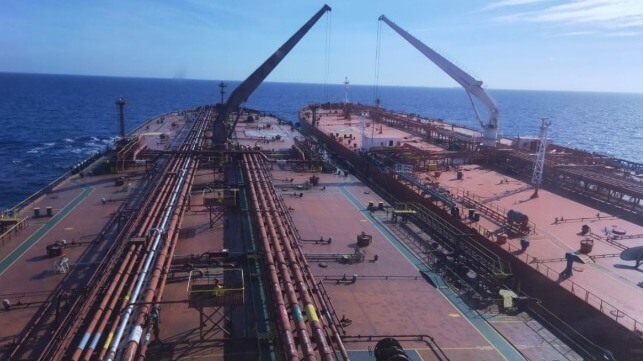IG: Sanctions Evasion is Growing More Sophisticated

The business of sanctions-busting is getting busier and more sophisticated, according to the International Group of P&I Clubs, especially for tanker operators. Venezuela and Iran have continued to export oil despite American sanctions, and Iran has had particularly strong success. As of the second quarter of 2021, Iran was exporting an estimated 1.3-1.7 million barrels per day, using a complex choreography of covert loadings to disguise the cargo's origins. This crude oil shuffle often uses multiple STS transfers between multiple vessels, according to analysts - raising the risk of sanctions exposure for unsuspecting tanker owners.
IG P&I advised its members that they have several strong incentives to avoid this trade and to take steps to avoid engaging in it accidentally. First, sanctions-busting is bad press, and any public report naming a ship or shipowner in connection with sanctions violations can result in severe reputational damage. In the past, the consequences of sanctions-busting allegations have included port bans, deflagging and loss of access to banking services - even if the allegation was unproven or untrue.
Second, insurance does not apply to voyages that violate sanctions. Insurance cover can be terminated if the club determines that the vessel's trade puts the club itself at risk of involvement in sanctions violations.
Tanker owners run the risk of unwittingly carrying sanctioned oil in many ways. If they've bareboat-chartered out a vessel, it could be doing something quite different than what the charterer says it's doing. Keeping tabs used to be easy with AIS monitoring, but over the course of the past year, a high-tech and effective form of AIS spoofing has grown more common. This trick makes it possible to broadcast a fake, lifelike AIS track that bears no relationship to the vessel's true position. The deception is hard to detect, and can produce very realistic movements that can only be spotted using satellite imagery or physical sightings of the ship.
"The IG is concerned that there is an increasing use of GPS/GNSS spoofing to hide the true location of vessels breaking sanctions," the insurer said.

that matters most
Get the latest maritime news delivered to your inbox daily.
Once sanctioned oil is smuggled aboard one vessel, it often gets passed around to other vessels using STS transfers. Iran's export methods are particularly complex, and they leverage legitimate STS operating areas like those off the coast of Iraq, where tankers have long rendezvoused to carry out routine cargo transfers. The paperwork accompanying these cargoes is falsified, but it is very difficult to detect the fakes - and with advanced AIS spoofing, it is difficult to detect which vessel might be carrying illicit cargo.
"STS operations should not be viewed in isolation. A legitimate operation between a vessel and a partner vessel may still present an exposure to sanctions if the partner vessel has previously engaged in an STS operation with a vessel carrying sanctioned cargo," cautioned IG P&I.
